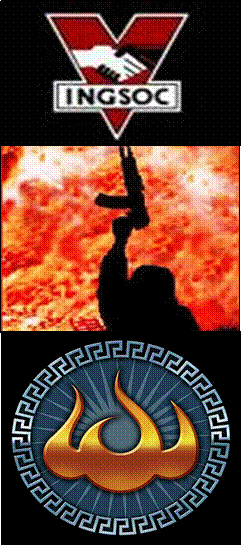|
George Orwell , Appendix To 1984 The Principles Of Newspeak And "Politics And The English Language" The linguistic satire of 1984 in part stems from, or at any rate parallels, a similar kind of satire in several works of a writer whom Orwell very much admired: Jonathan Swift. In Swift's A Tale of a Tub, and in Book III of Gulliver's Travels, there is a brilliant satire on what Swift considered to be the corruption of language for political or religious purposes. Swift's ideal of expression involved, above all things , clearness and precision of meaning. As he said in A Tale of a Tub, a satire on religious controversy and on the difference between true and sham religion, if a work really contains "light," that is, if it really is clear and has something to say, this fact will be apparent immediately to the average reader, who does not need extraordinary intelligence or perceptiveness to comprehend the truth, if the truth is in fact present. On the other hand, if it is the purpose of the writer deliberately to conceal his meaning and to confuse, he may do this under a fog of inexact, ill-chosen, and imprecise words. For Swift, this is a perversion of language. So with Orwell: for him, much political writing seeks not to reveal the truth, but to conceal it. The corruption of the English Language, which for Orwell was at its best a precise and noble medium of expression, takes two forms. The first, in 1984, involved the limitation of meaning and thought; as he put in, in the Appendix to 1984, "The purpose of Newspeak was not only to provide a medium of expression for the world-view and mental habits proper to the devotee of Ingsoc, but to make all other modes of thought impossible." This is an apparent impossibility, but it can be brought about by narrowing or destroying the connotations of words, so that each word will have one, and only one, meaning. Orwell, of course, exaggerates for the purposes of his satire. Allied with this stripping away of connotations (secondary meanings of words, as opposed to denotations, or primary meanings) is the process which he described in his essay "Politics and the English Language," published in 1946 just as he was seriously thinking about the subject matter of 1984. This process involves the decline of a language through political and economic causes, leading to deliberate lack of precision and use of soothing euphemisms as a substitute for hard reality. Thus political opponents of a totalitarian regime are not murdered or shot, they are eliminated or liquidated: words which do not carry the same connotations of brutality and tend therefore to obscure what is really happening. Stale words or neutral euphemisms become a substitute for thought. Both processes-narrowing of connotation and use of neutral euphemisms-are illustrated in 1984. Thus, "Politics and the English Language" is highly recommended for reading with the Appendix to 1984. Newspeak is a sort of exaggeration of Basic English, but the intent of the Party in making Newspeak the official language of Oceania has not involved the wish to simplify or the wish to make the language easier to learn by limiting the number of words and word relationships. Rather, the intent is obscurantist: to make certain thoughts impossible by removing the very concept in which these thoughts might be phrased from the English language. Thus, even a dictionary becomes a political document; the dictionary on which Syme is working, the Eleventh Newspeak Dictionary, is part of a gradual narrowing down of the meanings of words to prevent political heresy. "Free," for example, in Newspeak can have no reference to political freedom; it can be used only in a sense such as "the field is free from weeds." Political freedom no longer has even a name. Thus Newspeak diminishes the range of thought. By the timetable of the Party, Oldspeak, or Standard English as spoken, say, in the 1950s, will have been abolished by the year 2050. The actual language in 1984 is a cross between Newspeak and Oldspeak, as the process of changing language must by its very nature proceed slowly. But Orwell, as he projects ahead, leaves no doubt that given the conditions of life under Big Brother in Oceania, the change will be accomplished on schedule. Newspeak contains three vocabularies, called the A, B, and C vocabularies. The A vocabulary consists of words used in everyday life: what a traveler might need to get along in a foreign country-words involving such processes as eating, drinking, working, cooking, etc. All ambiguities and shades of meaning have been removed from these words, which were fairly neutral in political significance to begin with. It would be impossible to use the A vocabulary for political discussion. The B vocabulary consists of words which have been constructed for political purposes; these are compound words which are intended to foster approved modes of thought. Thus the word goodthink refers to the duty "to think in an orthodox manner," if one regards it as a verb. Its noun-verb is goodthink; its past tense and past participle is goodthinked; its present participle is goodthinking; its adjective is goodthinkful; its adverb, goodthinkwise; its verbal noun, goodthinker. These are abstract political concepts, but rigidly limited in meaning. They tend to reduce even the possibility of Thoughtcrime, while on the other hand, abstract words such as honor, justice, morality, internationalism, democracy, science, and religion have ceased to exist. These are, for the Party, dangerous words which may at least increase the possibility of Thoughtcrime. Many of the words in the B vocabulary were euphemisms, similar to those of which Orwell wrote earlier in "Politics and the English Language." Minipax is a contraction for Ministry of Peace, which is concerned with War. Joycamp is a euphemism for "forced labor camp" or "concentration camp"; Orwell perhaps got this satiric idea from certain euphemisms used to describe Nazi concentration camps, over the entrance to one of which was inscribed the cynical motto, so close to the thought of the Party in 1984: Arbeit Macht Frei ("work will make you free"). The C vocabulary is a specialized scientific and technical vocabulary, but the ordinary citizen of 1984 would have little need for these words, and would not be encouraged to learn them. In practice, heretical thoughts, then, are hardly possible. By 2050, the Party believes, they will be completely impossible. One might say "All men are equal," but the meaning would be limited to the sense in which one might say, "All men are redhaired." The secondary meaning, or connotation, of legal or political equality would have been purged from the word "equal." One could say, "Big Brother is ungood," but by the time of the establishment of a complete Newspeak vocabulary, the statement would merely convey in meaning a self-evident absurdity. Great literature is, for Orwell, an affirmation of man's liberty. Thus, the Party was engaged either in suppressing it, or in translating such literature into Newspeak: Shakespeare, Milton, Swift, Byron, and Dickens were to be translated, and when the task was complete, some time around 2050, the original writings of these men would be destroyed, because the words which they used might tend to promote heretical thoughts in their readers. "Political language," wrote Orwell in "Politics and the English Language," "is designed to make lies sound truthful and murder respectable, and to give the appearance of solidity to pure wind." The process which he saw as beginning in the 1930s and 1940s of the corruotion of the English language had developed, from the point of view of his satiric purpose, by 1984 into Newspeak. Yet Orwell thought of the process as subject to being reversed, as he wrote in this same essay. This is a hopeful sign, and tends to support the view, expressed earlier herein, that Orwell was not writing a prediction of things to come in 1984, but rather a warning, so that men would exercise the eternal vigilance which is the price of liberty. Copyright © 1993 Bureau of Electronic Publishing, Inc. |




|
READING / LITERATURE LITERATURE ON LINE |